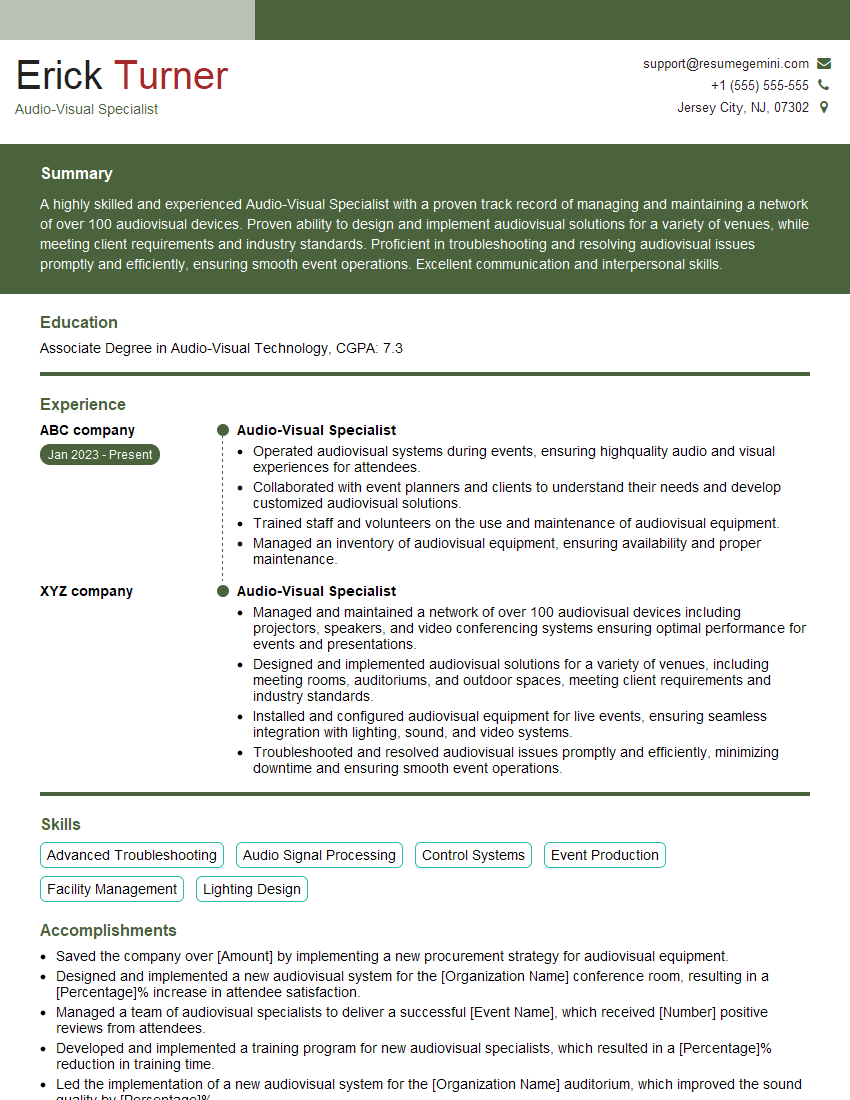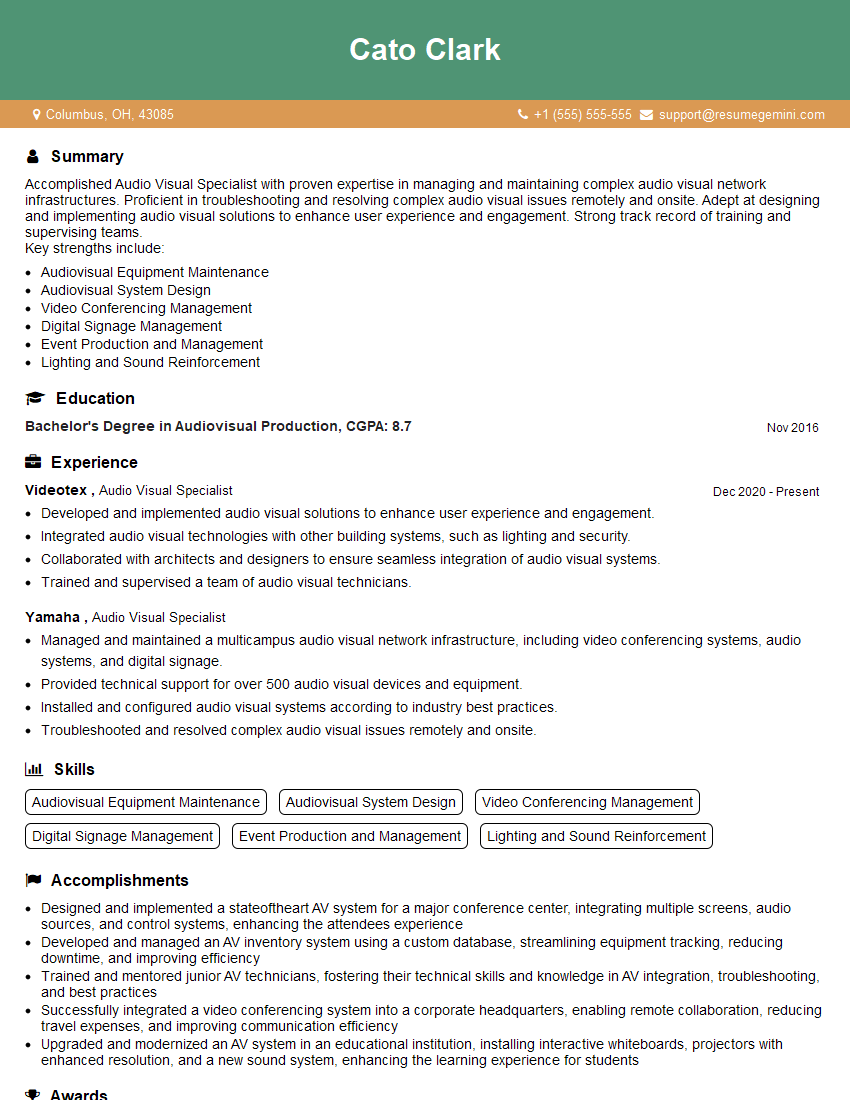Feeling lost in a sea of interview questions? Landed that dream interview for Audio-Visual Specialist but worried you might not have the answers? You’re not alone! This blog is your guide for interview success. We’ll break down the most common Audio-Visual Specialist interview questions, providing insightful answers and tips to leave a lasting impression. Plus, we’ll delve into the key responsibilities of this exciting role, so you can walk into your interview feeling confident and prepared.
Acing the interview is crucial, but landing one requires a compelling resume that gets you noticed. Crafting a professional document that highlights your skills and experience is the first step toward interview success. ResumeGemini can help you build a standout resume that gets you called in for that dream job.
Essential Interview Questions For Audio-Visual Specialist
1. Describe the key considerations when designing an audio-visual system for a large conference room?
When designing an audio-visual system for a large conference room, key considerations include:
- Room size and acoustics: The size and shape of the room, as well as its acoustics, will determine the type and placement of audio-visual equipment.
- Purpose of the room: The intended use of the room will influence the design of the audio-visual system. For example, a room used for presentations will require a different system than one used for video conferencing.
- Budget: The budget available will determine the type and quality of equipment that can be purchased.
- User requirements: The needs of the users must be taken into account when designing the system. For example, if users will be using their own laptops to connect to the system, the system must be able to accommodate multiple inputs.
2. How would you troubleshoot an issue with a video projector that is not displaying an image?
Check the power supply
- Ensure that the projector is plugged into a power outlet and that the power switch is turned on.
- Check the power cord for any damage or loose connections.
Check the input source
- Make sure that the correct input source is selected on the projector.
- Check the connection between the input source and the projector. Ensure that the cable is securely connected and that there is no damage to the cable or connectors.
Check the projector lamp
- The projector lamp may need to be replaced if it has reached the end of its lifespan.
- Follow the manufacturer’s instructions for replacing the lamp.
Check the projector’s settings
- Adjust the projector’s settings, such as the brightness, contrast, and color, to ensure that they are set correctly.
- Reset the projector to its factory default settings if necessary.
3. What are the different types of audio-visual equipment that you are familiar with?
I am familiar with a wide range of audio-visual equipment, including:
- Video projectors
- LCD and LED displays
- Plasma displays
- Audio systems
- Microphones
- Speakers
- Video conferencing systems
- Interactive whiteboards
- Digital signage
4. Describe your experience with installing and maintaining audio-visual systems.
I have over 5 years of experience in installing and maintaining audio-visual systems. I have worked on a variety of projects, from small meeting rooms to large auditoriums. I am proficient in installing and maintaining all types of audio-visual equipment, including:
- Video projectors
- LCD and LED displays
- Plasma displays
- Audio systems
- Microphones
- Speakers
- Video conferencing systems
- Interactive whiteboards
- Digital signage
5. What are your strengths and weaknesses as an audio-visual specialist?
Strengths
- Strong technical skills in the installation and maintenance of audio-visual equipment.
- Excellent problem-solving skills.
- Ability to work independently and as part of a team.
- Excellent communication and interpersonal skills.
Weaknesses
- Limited experience with some of the latest audio-visual technologies.
- Can be perfectionistic at times, which can lead to delays in completing projects.
6. What are your career goals?
My career goal is to become a highly skilled and experienced audio-visual specialist. I am passionate about audio-visual technology and I am always looking for ways to improve my skills and knowledge. I am eager to take on new challenges and responsibilities, and I am confident that I can make a significant contribution to any organization.
7. What is your availability?
I am available to start work immediately. I am flexible with my work schedule and I am willing to work overtime or on weekends if necessary.
8. Do you have any questions for me?
I do have a few questions:
- What are the specific responsibilities of this position?
- What are the company’s expectations for this position?
- What is the company’s culture like?
9. What are the latest trends in audio-visual technology?
Some of the latest trends in audio-visual technology include:
- The use of artificial intelligence (AI) to improve the user experience.
- The development of new display technologies, such as microLED and OLED.
- The increasing popularity of virtual reality (VR) and augmented reality (AR).
- The convergence of audio and video technology, such as the development of soundbars and smart speakers.
10. How do you stay up-to-date on the latest audio-visual technologies?
I stay up-to-date on the latest audio-visual technologies by:
- Reading industry publications and blogs.
- Attending industry events and conferences.
- Networking with other audio-visual professionals.
- Taking online courses and training programs.
Interviewers often ask about specific skills and experiences. With ResumeGemini‘s customizable templates, you can tailor your resume to showcase the skills most relevant to the position, making a powerful first impression. Also check out Resume Template specially tailored for Audio-Visual Specialist.
Career Expert Tips:
- Ace those interviews! Prepare effectively by reviewing the Top 50 Most Common Interview Questions on ResumeGemini.
- Navigate your job search with confidence! Explore a wide range of Career Tips on ResumeGemini. Learn about common challenges and recommendations to overcome them.
- Craft the perfect resume! Master the Art of Resume Writing with ResumeGemini’s guide. Showcase your unique qualifications and achievements effectively.
- Great Savings With New Year Deals and Discounts! In 2025, boost your job search and build your dream resume with ResumeGemini’s ATS optimized templates.
Researching the company and tailoring your answers is essential. Once you have a clear understanding of the Audio-Visual Specialist‘s requirements, you can use ResumeGemini to adjust your resume to perfectly match the job description.
Key Job Responsibilities
Audio-Visual Specialists are responsible for the planning, installation, maintenance, and repair of audio-visual equipment and systems. They work in a variety of settings, including schools, businesses, and government agencies.
1. Equipment Installation and Maintenance
Audio-Visual Specialists install and maintain a variety of audio-visual equipment, including projectors, sound systems, and video conferencing systems. They ensure that the equipment is functioning properly and that it is up to date with the latest technology.
- Install and configure audio-visual equipment, including projectors, sound systems, and video conferencing systems
- Perform regular maintenance on audio-visual equipment to ensure that it is functioning properly
2. System Design and Integration
Audio-Visual Specialists design and integrate audio-visual systems for a variety of purposes. They work with clients to determine their needs and then design a system that meets those needs.
- Design and integrate audio-visual systems for a variety of purposes, including presentations, training, and video conferencing
- Work with clients to determine their needs and then design a system that meets those needs
3. Troubleshooting and Repair
Audio-Visual Specialists troubleshoot and repair audio-visual equipment and systems. They diagnose problems and then take steps to resolve them.
- Troubleshoot and repair audio-visual equipment and systems
- Diagnose problems and then take steps to resolve them
4. Training and Support
Audio-Visual Specialists provide training and support to users of audio-visual equipment and systems. They teach users how to use the equipment and how to troubleshoot problems.
- Provide training and support to users of audio-visual equipment and systems
- Teach users how to use the equipment and how to troubleshoot problems
Interview Tips
Preparing for an interview for an Audio-Visual Specialist position can be daunting, but with the right preparation, you can increase your chances of success. Here are a few tips to help you prepare for your interview:
1. Research the Company and the Position
Before you go on an interview, it is important to research the company and the position you are applying for. This will help you to understand the company’s culture and values, as well as the specific requirements of the position.
- Visit the company’s website and social media pages
- Read articles about the company and the industry
- Talk to people who work at the company or who have worked there in the past
2. Practice Answering Common Interview Questions
There are a number of common interview questions that you are likely to be asked, such as “Tell me about yourself” and “Why are you interested in this position?” It is important to practice answering these questions so that you can give clear and concise answers.
- Write down your answers to common interview questions
- Practice answering the questions out loud
- Get feedback from a friend or family member
3. Be Prepared to Talk About Your Experience
In your interview, you will likely be asked about your experience in the audio-visual field. Be prepared to talk about your skills and experience in detail.
- Highlight your experience in installing, maintaining, and repairing audio-visual equipment
- Describe your experience in designing and integrating audio-visual systems
- Share examples of your troubleshooting and repair skills
4. Dress Professionally and Arrive on Time
First impressions matter, so it is important to dress professionally for your interview. You should also arrive on time for your interview. Punctuality shows that you are organized and respectful of the interviewer’s time.
- Dress in a suit or business casual attire
- Arrive at the interview location at least 15 minutes early
- Be polite and respectful to the receptionist and interviewer
Next Step:
Armed with this knowledge, you’re now well-equipped to tackle the Audio-Visual Specialist interview with confidence. Remember, preparation is key. So, start crafting your resume, highlighting your relevant skills and experiences. Don’t be afraid to tailor your application to each specific job posting. With the right approach and a bit of practice, you’ll be well on your way to landing your dream job. Build your resume now from scratch or optimize your existing resume with ResumeGemini. Wish you luck in your career journey!

